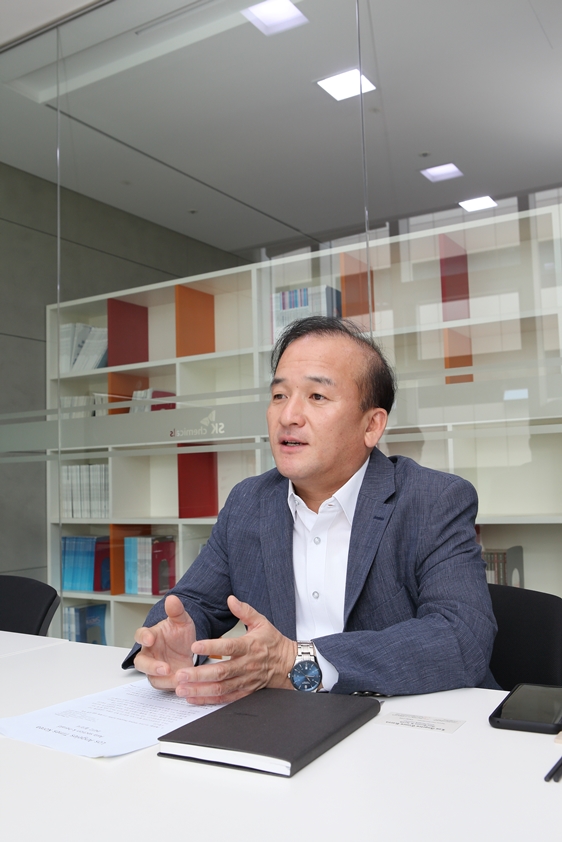INITZ, a subsidiary of SK Chemicals, makes a full-fledged entry into the global automobile industry.
INITZ CEO Hyo Kyung Kim announced on June 25th, 2018 that they will venture into the automotive business with great potential. More specifically, INITZ will be specializing in automotive lamp parts. As of late, this was known to be one of the slowest areas of technological development, due to inadequate evaluation conditions and constant exposure to high temperatures.
This phenomenon is called “lamp haze,” where gas generated from plastic parts sticks to the inner wall. This is caused by inherent properties of plastic that produce gas at high temperatures. Moreover, due to the nature of vehicle lamps, the internal temperatures of which can rise up to 200 degrees, the parts must have a moisture resistance function that is caused by extreme temperature differences. The car lamp benefits both the vehicle’s owner and other drivers because it aids in visibility. Therefore, it is crucial that these lights work properly, for the sake of everyone’s safety both on and off the road; if the lamps are too fogged up, it can even threaten the lives of pedestrians who happen to be in harm’s way.

Despite this being a prevalent issue, many companies have not been able to come up with a fundamental solution; if anything, many global companies have been focusing on temporary solutions to a long-term problem. Fortunately for car-owners, this no longer has to be an issue, thanks to INITZ.
INITZ has been working with Hyundai Mobis to develop new materials for vehicle lamps. The biggest advantage of their newest product is that it ensures less gas build-up and other impurities. The INITZ PPS (Poly Phenylene Sulfide) is also produced through an environmentally friendly process, and made with glass fiber and a polymer additive, which reinforces and strengthens the material overall. This ensures rigidity so that components or parts do not shake even against strong external forces or vibrations.
So how do we know that this new lamp works? To verify the reliability of the INITZ PPS, Hyundai Mobis repeatedly tested it in eight evaluation categories, including heat and moisture resistance, for about three months. It was reported that the PPS was also able to withstand a severe environmental test where the product was placed in a temperature chamber with the light turned on for 72 hours straight.
Thanks to their new non-chlorine PPS technology, INITZ has become the lead developer in this area of technology. Their “low out gas” function is one of the first of its kind, and it is currently being applied to new vehicles and future car headlamps. A representative of the automobile industry claimed, “Despite our use of generic car parts, the PPS can still be applied with ease, even while the car is being built.”

The company plans to speedily expand overseas based on this contribution to existing automotive lamp technology. Since the lamp is an integral part of a vehicle that helps people distinguish it in dark lighting conditions, the INITZ PPS is expected to dominate the automotive world. The company CEO also said confidently that they “have solved the problem of high-intensity automobile lamp haze through experience and new technology developed for the world’s first chlorine-free PPS. We will continue to pursue the global auto parts market by developing even newer material.” Currently, both INITZ and Hyundai Mobis are filing patents for at-home use and exports.
l Explanation of Terms
* INITZ ; www.initzpps.com
: INITZ was established in 2013 as a joint venture between SK Chemicals co. ltd. of Korea and TEIJIN LIMITED of Japan. INITZ manufactured the world’s first Non-Chlorine PPS with innovative and differentiated technology.
* Chlorine-free PPS (Poly Phenylene Sulfide)
: PPS is Super Engineering Plastic with high performance and weight reduction which can replace metal. INITZ’s PPS is the first of its kind that is non-chlorine and eco-friendly. It also minimizes outgas and impurities by utilizing the technology of neither the solvent nore by-product (NaCl)
Dean Lee
K-Herald Korea
(Los Angeles Times Advertising Supplement)



